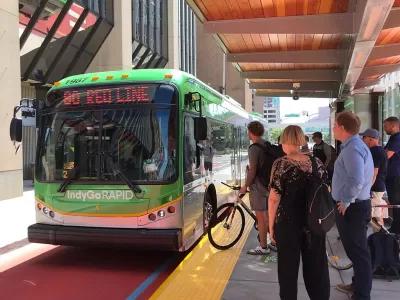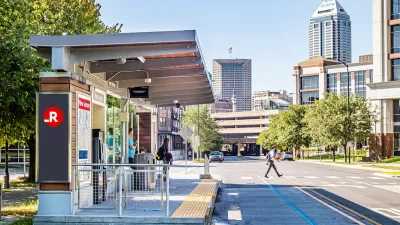A law proposed in the Indiana state legislature would ban dedicated bus lanes and force IndyGo to cancel a planned bus rapid transit line to the city's airport.

Kayla Dwyer reports on a state preemption effort that would effort to ban dedicated bus lanes from much of downtown Indianapolis, effectively canceling a planned bus rapid transit line that would connect downtown to the Indianapolis International Airport.
The proposed bill would prohibit IndyGo from building dedicated bus lanes outside of the Mile Square neighborhood, with lawmakers voicing concerns about increased congestion and delays for drivers. But an analysis of a plan that puts BRT lanes on the left side of the street showed that vehicle wait times at intersections wouldn't exceed the city standard of 55 seconds or less.
Since federal funding for the BRT project is contingent on dedicated bus lanes, the new law would cut short IndyGo's efforts to build the new line by eliminating $100 million in federal funds that are crucial to the $220-million project. In a statement, the agency said "This move would effectively cripple an entire system designed to provide improved, faster and more reliable transit for Marion County," expressing disappointment at lawmakers' reluctance to prioritize rapid transit.
At lawmakers' request, IndyGo presented two alternative designs, both of which would add millions to the total cost of the project and provide slower service for bus users.
IndyGo's BRT projects survived legislative peril last year, when lawmakers sought to hold the agency responsible for a higher percentage of its costs with Senate Bill 141, which failed to advance out of committee.
FULL STORY: Bill would 'cancel' IndyGo's Blue Line by banning dedicated bus lanes outside Mile Square

Manufactured Crisis: Losing the Nation’s Largest Source of Unsubsidized Affordable Housing
Manufactured housing communities have long been an affordable housing option for millions of people living in the U.S., but that affordability is disappearing rapidly. How did we get here?

Americans May Be Stuck — But Why?
Americans are moving a lot less than they once did, and that is a problem. While Yoni Applebaum, in his highly-publicized article Stuck, gets the reasons badly wrong, it's still important to ask: why are we moving so much less than before?

Research Shows More Roads = More Driving
A national study shows, once again, that increasing road supply induces additional vehicle travel, particularly over the long run.

Which US Rail Agencies Are Buying Zero-Emissions Trains?
U.S. rail agencies are slowly making the shift to zero-emissions trains, which can travel longer distances without refueling and reduce air pollution.

San Diego School District Approves Affordable Housing Plan
The district plans to build workforce housing for 10 percent of its employees in the next decade and explore other ways to contribute to housing development.

Lawsuit Aims to Stop NYC’s ‘City of Yes’ Zoning Reforms
A lawsuit brought by local lawmakers and community groups claims the plan failed to conduct a comprehensive environmental review.
Urban Design for Planners 1: Software Tools
This six-course series explores essential urban design concepts using open source software and equips planners with the tools they need to participate fully in the urban design process.
Planning for Universal Design
Learn the tools for implementing Universal Design in planning regulations.
City of Moreno Valley
Institute for Housing and Urban Development Studies (IHS)
City of Grandview
Harvard GSD Executive Education
NYU Wagner Graduate School of Public Service
City of Cambridge, Maryland
Newport County Development Council: Connect Greater Newport





























